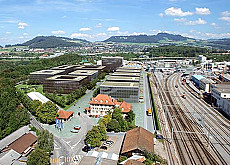Schmid says minaret ban is the “wrong road”

Cabinet minister Samuel Schmid of the rightwing Swiss People's Party says he is against an initiative to ban the construction of minarets in Switzerland.
Schmid said the initiative, launched by some of his party members, was going down the “wrong road”. The idea has already provoked strong criticism both in Switzerland and in the Muslim world.
“We would not solve any problems with such a move,” commented Schmid in the “SonntagsZeitung newspaper.
Those behind the people’s initiative have until November 2008 to raise the 100,000 signatures required to force a nationwide vote on the issue.
Opponents are angling their attack on article 72 of the Swiss constitution, which allows the authorities to take appropriate measures to maintain the peace among different religious communities.
Schmid, who is the defence minister, said if the construction of a minaret was forbidden because of building regulations, it was a matter for Switzerland’s 26 cantons.
Certain concern
But if it were a ban on religious grounds, this would go against religious freedom that was guaranteed in the Swiss constitution.
Schmid did not deny there was an Islam problem in Switzerland. “The initiative is the expression of a certain concern,” he said.
“This concern has to be taken seriously, independently of the contents of the people’s initiative, which I clearly reject.
“Islam is just as much to be respected as Christianity, Judaism, Buddhism and the other religions.”
Even though Schmid rejects the initiative, he said he was not going on a confrontation course with his party.

More
People’s initiative
No wedge
“The Swiss People’s Party has not officially expressed an opinion on the initiative and I will always oppose media attempts to drive a wedge between my party and me.”
The party is expected to give its views on the initiative at a meeting on June 30. The Swiss government has not yet given its opinion.
The group behind the initiative, more than half of whom are People’s Party’s parliamentarians, said in a statement that a ban would help stop “attempts by Islamist circles to impose a legal system based on the Shariah in Switzerland.”
Some of the politicians said they did not oppose mosques or Muslims’ right to worship.
Switzerland’s Muslim community commented after the launch of the initiative that it was stunned by what it saw as an “Islamophobic” move, which it warned would undermine already fragile relations.
Anger
The initiative for a minaret ban has angered both Muslims in and outside Switzerland.
“As an organisation that is helping Muslims to integrate and become model citizens, we are shocked by this initiative,” Adel Méjri, president of the League of Swiss Muslims, told swissinfo.
There was also angry reaction in media blogs in the Muslim world, with one voice calling for a boycott of Swiss banks.
Readers were particular incensed by remarks they deemed Muslim-hostile from some of those behind the initiative.
swissinfo with agencies
A minaret is a tower, traditionally part of a mosque, with a balcony from which a muezzin calls Muslims to prayer. In modern mosques, the minaret is equipped with loudspeakers.
In Switzerland, only the mosques in Geneva and Zurich have a minaret. The call to prayer is not made from these minarets.
A survey last year in Le Matin newspaper found that 43% of French-speaking Swiss questioned favoured a ban on minarets.
In Switzerland, more than three quarters of the population are Christians – 42% are Catholic, 35% Protestant and 2.2% other Christian religions.
With more than 310,000 members (4.3%), Islam is the second-largest religion in the country. Twelve per cent of Muslims have a Swiss passport. They come mainly from the Balkans and Turkey.
The Jewish community has about 18,000 members (0.2%), of which 80% are Swiss.
There are 28,000 Hindus and 21,000 buddhists.

In compliance with the JTI standards
More: SWI swissinfo.ch certified by the Journalism Trust Initiative













You can find an overview of ongoing debates with our journalists here . Please join us!
If you want to start a conversation about a topic raised in this article or want to report factual errors, email us at english@swissinfo.ch.